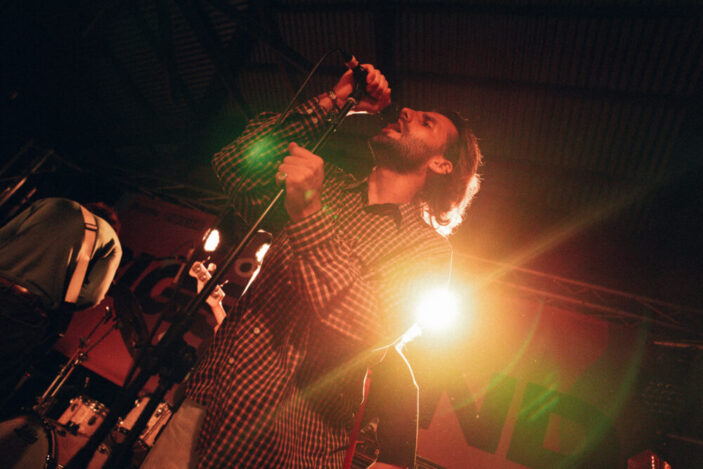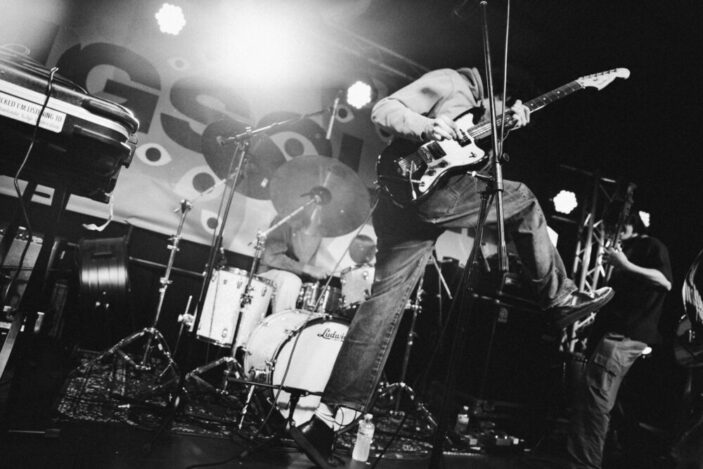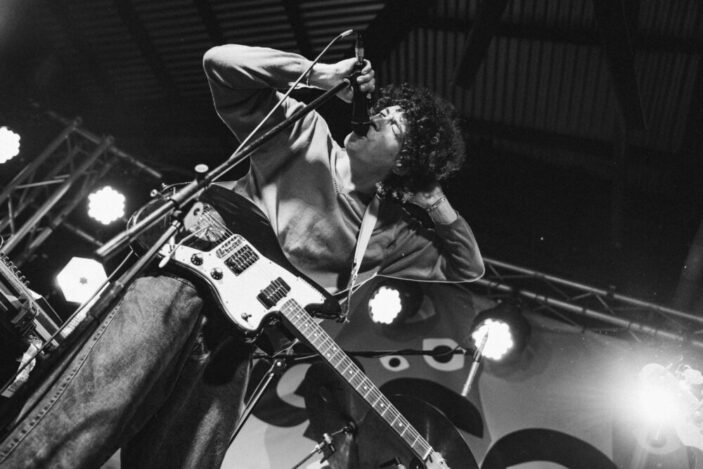
In the age of the internet, where over-consumption reigns supreme, finding authenticity can feel like trying to find a unicorn. Where Temu offers knock-off Matisse art for $2.99, mainstream music offers algorithmic, surface-level tunes designed not to inspire but to sell. According to IDLES mouthpiece Joe Talbot, “art and music are the only way anyone on the planet can truly feel like they’re part of something bigger than themselves.” So, when a band like Newcastle’s Dust come out delivering real, honest music, it feels like you’ve hit the jackpot.
Despite their small-town beginnings, post-punk band, Dust have created a name for themselves that’s almost as omnipresent as the household dust that sits atop your bookshelf. Having supported Interpol and Bloc Party on tour and playing packed-out sets at Bigsound 2024, it’s no wonder The Live Wire claim that “This band could be one of the country’s most singular and essential bands.”
In a time where right-wing politics and the invisible hands of capitalism grip every corner of the world, maybe the greatest act of radicalism is to make art for art’s sake. Perhaps best said by Lester Bangs in Almost Famous: “The only true currency in this bankrupt world is what you share with someone else when you’re uncool.” To forgo the whims of the content machine and create something that dares to be misunderstood is a profound act of resistance.
A genre for “everything outside of everything else,” post-punk is uniquely hard to pin down. Increasingly becoming a genre defined by what it’s not, post-punk offers a refuge for the outsider and a boundary-less space for musicians to explore.
Born in the late 70s, post-punk emerged from the chaos of punk rock, departing from its precursor’s overt lyricism and simplistic instrumentals while retaining its ethics and do-it-yourself attitude. Originally labelled as “new musick,” post-punk favoured contemporary, experimental approaches, often borrowing elements from (and bridging the gap between) other genres. Used to denote music that intentionally defies the predetermined punk-rock template, post-punk is less a genre than a space of possibility. “What unites all this activity,” Simon Reynolds suggests in his book Rip it Up and Start Again, “is a set of open-ended imperatives: innovation; wilful oddness; the wilful jettisoning of all things precedented or ‘rock’n’roll.”

As a defiant rejection of corporate-conformity, post-punk took the original punk movement and aggrandised it. This, combined with its intersection of arts, culture and politics from a working- or low-class perspective, gave post-punk a relatable and exciting edge from its predecessor. Decades later, the scene has continued to evolve, but its legacy remains.
Yet, amongst this chronically online wasteland led by various doom-scrolling applications (*cough* TikTok *cough*) and a music industry favouring dopamine-saturated, 30-second pop-earworms, people are screaming for something different and real.
With raw, stream-of-consciousness lyrics and audacious vocals Dust calls to the self that’s often forgotten (or more aptly put, ignored) in the haste of the 21st century world. The five-piece speak to issues like mental (and physical) health, wanton self-medication and the difficulty of being a human with emotions in a world that asks you to have none. Relatable without being definitive, Dust discuss outward topics from an inward view, such as their lyrics from Joy (Guilt), an internal monologue style train of seemingly unrelated one liners and self-help quotes.
Placing their music at the forefront of everything they do, Dust offer a direct antithesis to the focus that mainstream media places on the creator, rather than the creation. As Popped Music notes, “[It’s] refreshing to see a band that are clearly creating music that is for them and how they want it to be – it’s a bonus it’s also just really f*cking great”. Combining all the elements of post-punk with playful saxophone and bustling synth layers, the quintet creates idiosyncratic music that is not easily categorised.
The genre has previously been described by journalist Nicholas Lezard as ‘a blend of art and music, or, to be more precise, art being used to create rock music’. On their debut EP, et cetera, etc, Dust have composed not only a musical portfolio, but a piece of sonic art. The EP, with songs such as Intro, Interlude and Outro plays like a conceptual narrative with a clear beginning, middle and end.

Across their (admittedly limited) discography, Dust carry a sense of urgency that gives voice to the universal discontent of living in a society that is capricious in its distribution of pain. Their music offers the listener a channel by which to feel anger without aggression, and a safe space to explore frustration about issues both internal and external. Embracing the angular, avant-garde experimentation and non-rock inspirations of post-punk, the band understand that to recreate existing music is not only a discredit to themselves, but a disservice to their post-punk lineage.
To compare Dust to Gang of Four, King Krule, Shame, and Fontaines D.C. seems unfair, but I’m doing it anyway. Using voicemails found on a tape machine at a family home and only recording in a studio for the first time for their most recent track Trust U See, the quintet are hands-on innovators. Continually honing their own sound and taking a DIY approach with everything they do, the band have certainly earned merit in their own right.
From crammed Bigsound shows, to New York label releases and festival sets, it’s clear that Dust is in the air. The band exhibit a depth and breadth of creative vision and skill that many bands—even those with years of experience—seldom manage to achieve. From my place at their Bigsound set, I can attest to the collective, carbonated excitement of seeing something that’s both good and real. To forgo the algorithm in favour of authenticity is undoubtedly a bold move in the gluttonous, profit-obsessed society of today, but maybe that’s exactly what we all need.
Keep tabs on Dust on their official website.
This piece was created as part of The Music Writer’s Lab 2024 Commissioning Fund.
Photos by Nathan Rathsam, provided by Bigsound.
